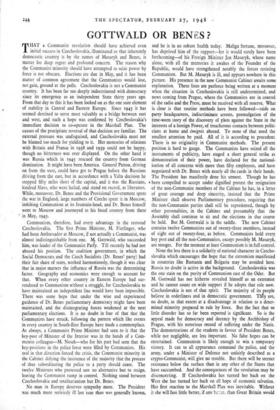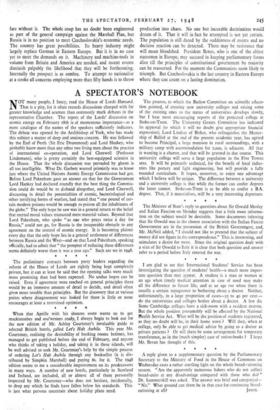GOTTWALD OR BEN ES ?
1 HAT a Communist revolution should have achieved even initial success in Czechoslovakia, illuminated as that inherently democratic country is by the names of Masaryk and Benes, is matter for deep regret and profound concern. The reason why the Communist minority should have attempted to seize power by force is not obscure. Elections are due in May, and it has been matter of common agreement that the Communists would lose, not gain, ground at the polls. Czechoslovakia is not a Communist country. It has been far too deeply indoctrinated with democracy since its emergence as an independent State thirty years ago. From that day to this it has been looked on as the one sure element of stability in Central and Eastern Europe. Since 1945 it has seemed destined to serve most valuably as a bridge between east and west, and such a hope was confirmed by Czechoslovakia's immediate decision to co-operate in the Marshall Plan. The causes of the precipitate reversal of that decision are familiar. The external pressure was undisguised, and Czechoslovakia must not be blamed too much for yielding to it. Her memories of relations with Britain and France in 1938 and 1939 could not be happy, though no bitterness was ever displayed. On the other hand it was Russia which in 1945 rescued the country from German domination. It might have been America. General Patton, driving on from, the west, could have got to Prague before the Russians driving from the east, but in accordance with a Yalta decision he stopped fifty miles short of the capital, and it Was the Russians, kindred Slays, who were hailed, and stand on record, as liberators. While, moreover, Dr. Benes and the Provisional Government spent the war in England, large numbers of Czechs spent it in Moscow, imbibing Communism at its fountain-head, and Dr. Benes himself went to Moscow and journeyed to his freed country from there in May, 1945.
Communism, therefore, had every advantage in the restored Czechoslovakia. The first grime Minister, M. Fierlinger, who bad been Ambassador at Moscow, if not actually a Communist, Was almost indistinguishable from one. M. Gottwald, who succeeded him, was leader of the Communist Party. Till recently he had not abused his position. The coalition government, in which the Social Democrats and the Czech Socialists (Dr. Benes' party) had their fair share of seats, worked harmoniously, though it was clear that in major matters the influence of Russia was the determining factor. Geography and economics were enough to account for that. When every other country in Eastern Europe had sur- rendered to Communism without a struggle, for Czechoslovakia to have maintained an independent line would have been impossible. There was some hope that under the wise and experienced guidance of Dr. Benes parliamentary democracy might have been maintained, and the disintegrating forces weakened at the next parliamentary elections. It is no doubt in fear of that that the Communists have struck, following the pattern which like events in every country in South-East Europe have made a commonplace. As always, a Communist Prime Minister had seen.to it that the key-post of Minister of the Interior was in the hands of a Com- munist colleague—M. Nosek—who for his part had seen that the key-positions in the police force were filled by Communists. His zeal in that direction forced the crisis, the Communist minority in the Cabinet defying the insistence of the majority that the process of thus subordinating the police to a party should cease. The twelve Ministers who protested saw no alternative but to resign. leaving the Communist rump in control. Nothing stood between Czechoslovakia and totalitarianism but Dr. Benes.
No man in Europe deserves sympathy more. The President was much more seriously ill last year than was generally known, and he is in no robust health today. Malign fortune, moreover, has deprived him of the support—for it would surely have been forthcoming—of his Foreign Minister Jan Masaryk, whose name alone, with all the memories it awakes of the Founder of the Republic, would have strengthened notably the forces resisting Communism. But M. Masaryk is ill, and appears nowhere in this picture. His presence in the new Communist Cabinet awaits some explanation. These lines are perforce being written at a moment when the situation in Czechoslovakia is still undetermined, and news coming from Prague, where the Communists are in control of the radio and the Press, must be received with all reserve. What is clear is that routine methods have been followed—raids on party headquarters, indiscriminate arrests, promulgation of the time-worn story of the discovery of plots against the State in the interests of a foreign Power, of treacherous contacts between politi- cians at home and émigrés abroad. To none of that need the smallest attention be paid. All of it is according to precedent. There is no originality in Communist methods. The present position is hard to gauge. The Communists have seized all the instruments of publicity, have staged a short general strike as demonstration of their power, have declared for the national- isation of all concerns with more than fifty employees, and have negotiated with Dr. Benes with nearly all the cards in their hands. The President has manifestly done his utmost. Though he has been compelled to accept under dignified protest the resignation of the non-Communist members of the Cabinet he has, in a letter of great courage and deep sincerity, insisted that the Prime Minister shall observe Parliamentary procedure, requiring that the non-Communist parties shall still be reprefented, though by other personalities, in the Cabinet and presumably that the Assembly shall continue to sit and the elections in due course be held. But M. Gottwald is in the saddle. The new Cabinet contains twelve Communists out of twenty-three members, instead of eight out of twenty-four, as before. Communists hold every key post and all the non-Communists, except possibly M. Masaryk, are stooges. For the moment at least Communism is in full control.
None the less there is a solidarity of national character in Czecho- slovakia which encourages the hope that the extremism manifested in countries like Rumania and Bulgaria may be avoided here. Russia no doubt is active in the background. Czechoslovakia was the one stain on the purity of Communism east of the Oder. But M. Gottwald has nor hitherto revealed himself as an extremist and he cannot count on wide support if he adopts that role now. Czechoslovakia is not of that spirit. The majority of its people believe in orderliness and in democratic government. They are, no doubt, to that extent at a disadvantage in relation to a deter-. mined minority .prepared to rule by force. But the fact that so little disorder has so far been reported is significant. So is the appeal made for democracy and decency by the Archbishop of Prague, with his notorious record of suffering under the Nazis. The demonstrations of the students in favour of President Benes, while not negligible, are less important. No false hopes can be entertained. Communism is likely enough to win a temporary victory. It can to all appearance command the police, and the army, under a Minister of Defence not unfairly described as a crypto-Communist, will give no trouble. But there will be sterner resistance below the surface than in any other of the States that have succumbed. And the consequences of the revolution may be disconcerting. If Czechoslovakia has turned her back on the West she has turned her back on all hope of economic salvation. Her first reaction to the Marshall Plan was inevitable. Without it she will fare little better,- if any be::er. than Great Britain would fare without it. The Whole coup has no doubt been engineered as part of the general campaign against the Marshall Plan, but Russia is in no position to meet Czechoslovakia's economic needs. The country has great possibilities. Its heavy industry might largely replace German in Eastern Europe. But it is in no case yet to meet the demands on it. Machinery and machine-tools in volume from Britain and America are needed, and recent events diminish palpably the likelihood that they will be forthcoming. Internally the prospect is as sombre. To attempt to nationalise at a stroke all concerns employing more than fifty hands is to throw production into chaos. No one but incurable doctrinaires would dream of it. That it will in fact be attempted is not yet certain. The population is still dazed by the suddenness of events and no decisive reaction can be detected. There may be resistance that will mean bloodshed. President Benes, who is one of the ablest statesmen in Europe, may succeed in keeping parliamentary forms alive till the principles of constitutional government by majority can be reasserted. For the moment the Communists seem likely to triumph. But Czechoslovakia is the last country in Eastern Europe where they can count on a lasting domination.



































 Previous page
Previous page